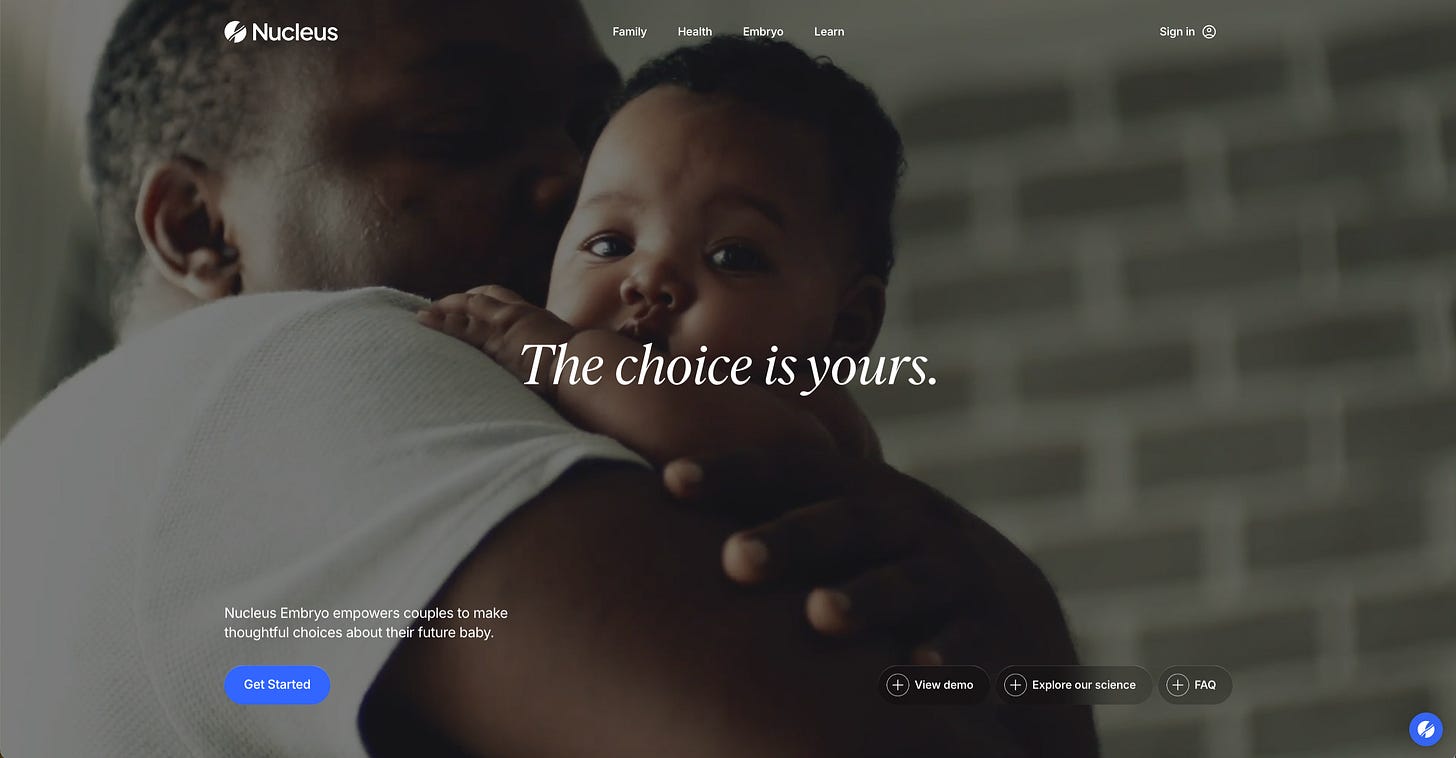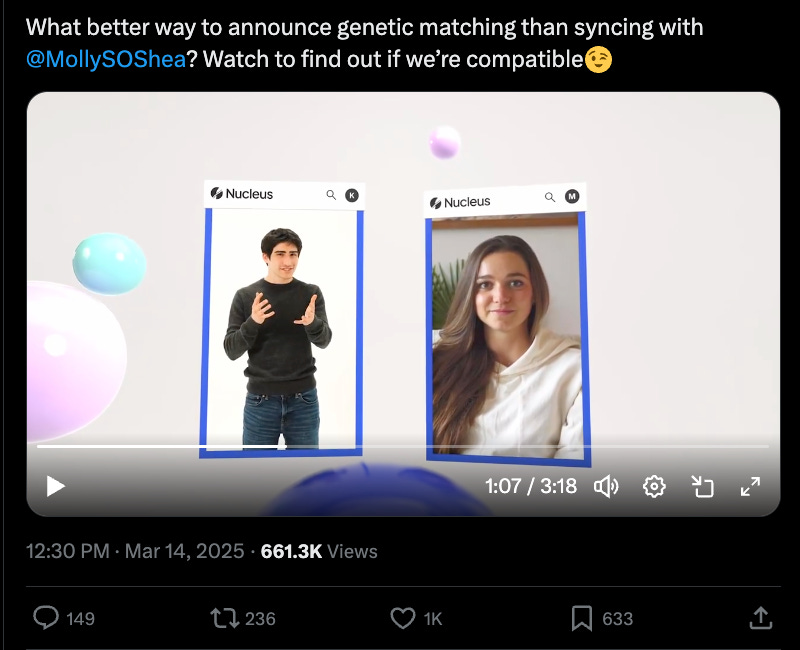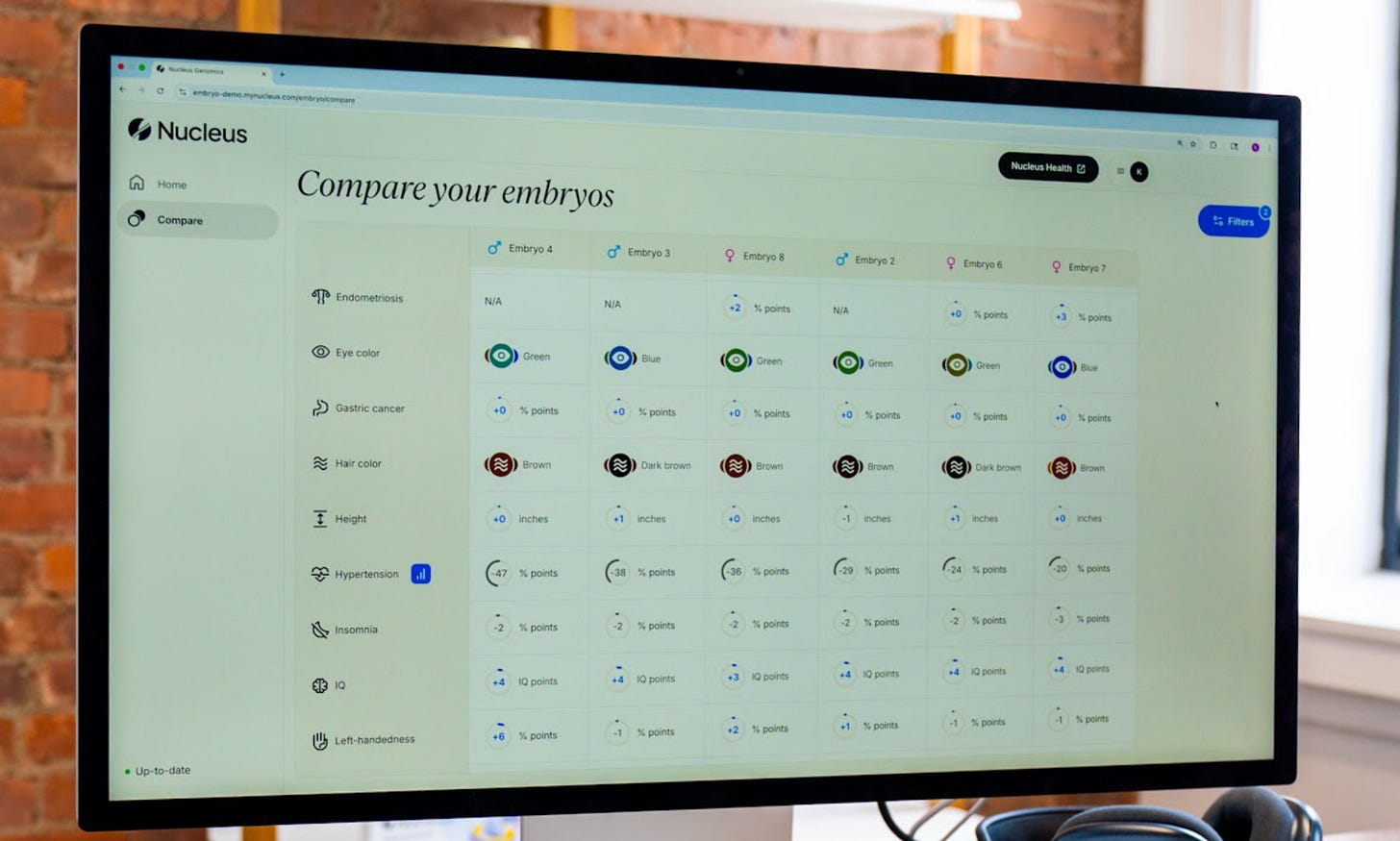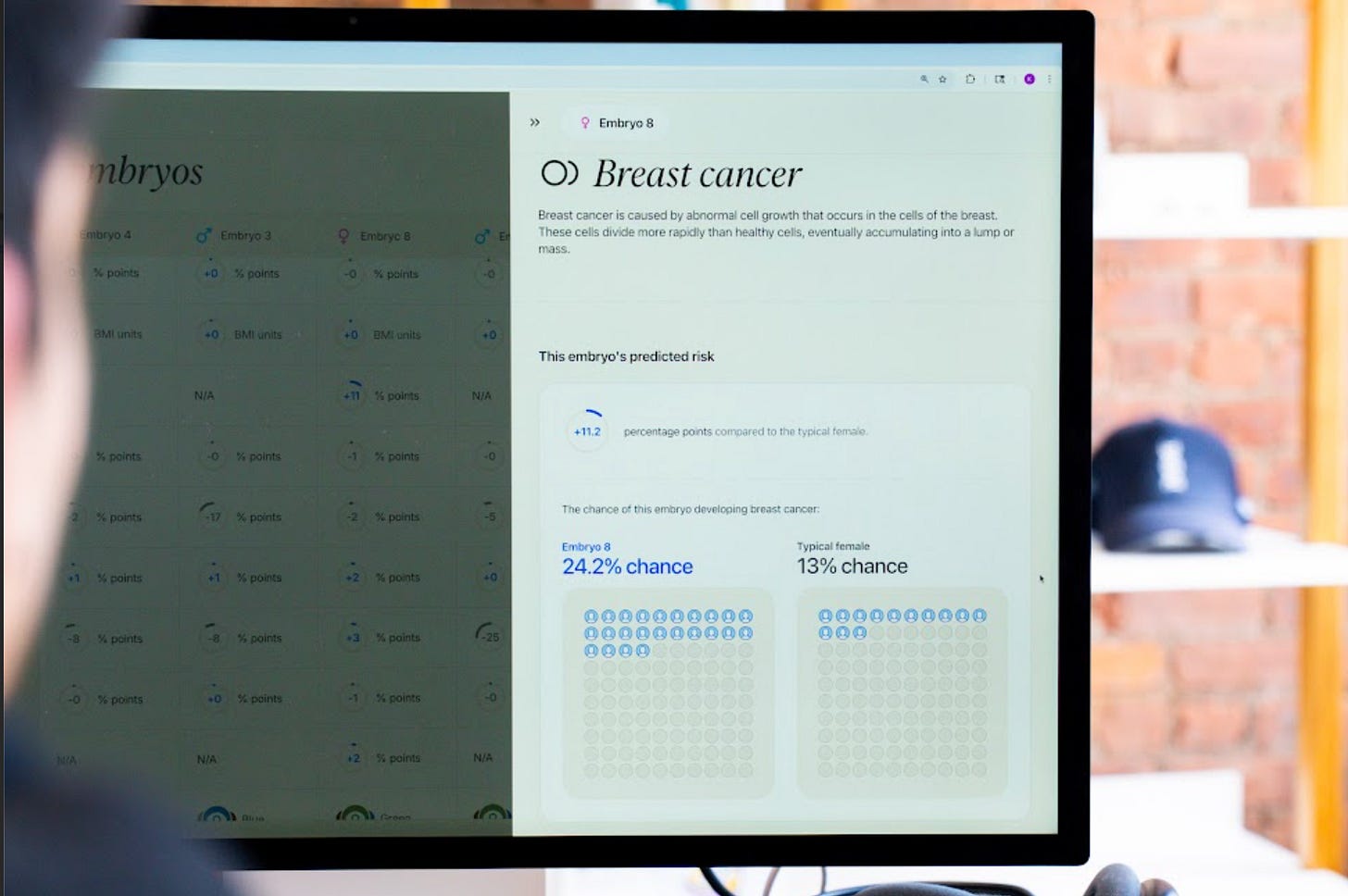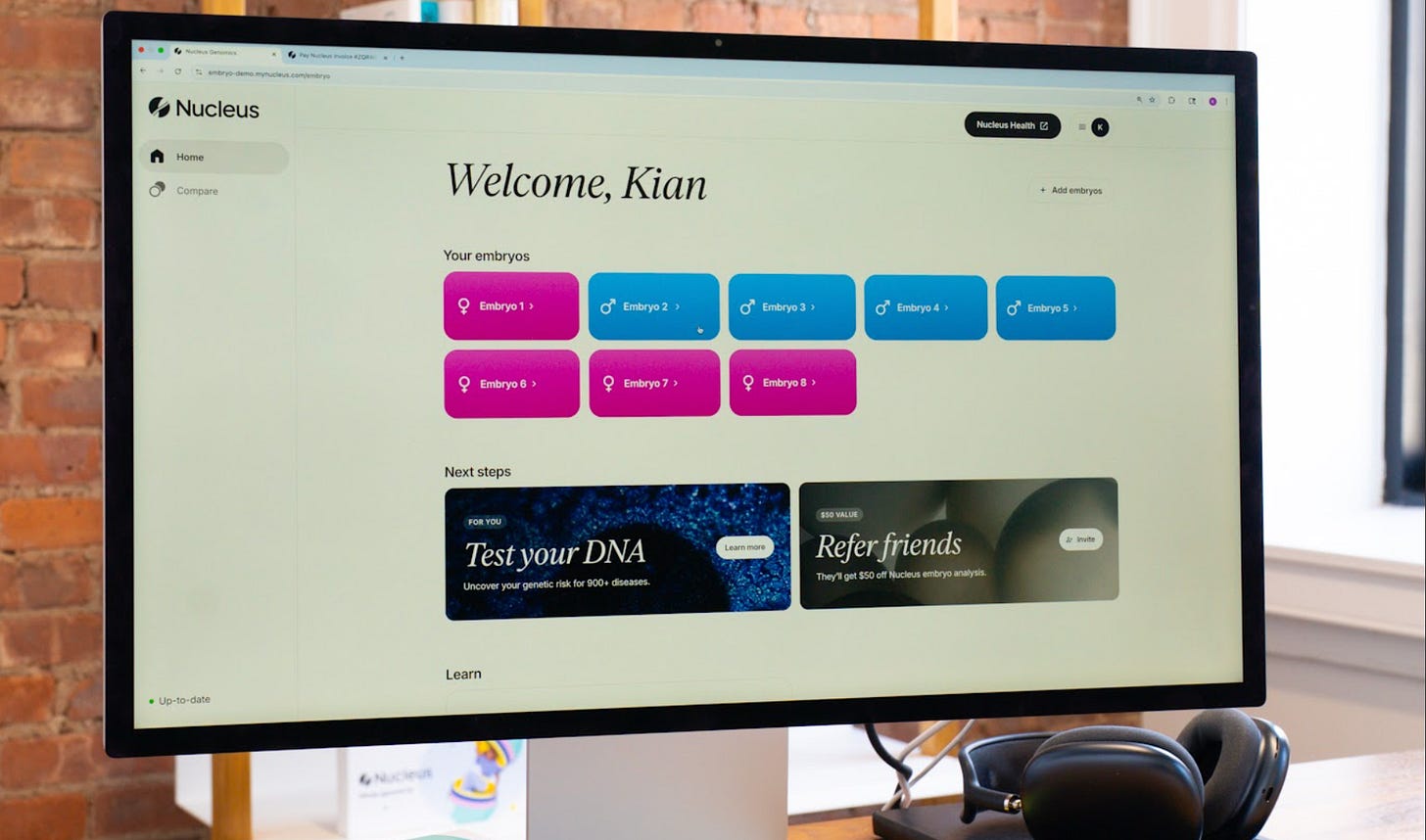BREAKING: Nucleus Launches First Genetically Optimized Embryo
Nucleus Founder & CEO Kian Sadeghi
Groundbreaking Launch of Nucleus Embryo Amid Global Fertility Crisis
With $32M in total funding, Nucleus CEO Kian Sadeghi joins Molly to discuss the groundbreaking launch of Nucleus Embryo, a genetic optimization software designed to give children the best possible start in life. Kian explains how the software analyzes comprehensive genetic profiles of embryos, helping parents make informed decisions about traits such as disease risks and physical characteristics.
→ Listen on X, Spotify, YouTube, Apple
The conversation delves into partnerships with companies like Genomic Prediction, the significance of this innovation in the broader context of the fertility crisis, and the ethical considerations and future implications of genetic optimization. Nucleus also touches on the affordability and accessibility of this technology, ensuring it becomes a universal tool for all prospective parents.
Deep dive below.
Highlights:
0:55 - What is Nucleus Embryo?
2:08 - What does genetic optimization for embryos mean?
4:13 - Why is this now possible vs 5 years ago?
6:11 - The current state of fertility
10:53 - How does Nucleus fit into the fertility crisis?
12:20 - Why do parents still feel like having children is hitting a lottery ticket?
13:18 - The defining moment for the genetics industry
15:46 - What does this all mean for users?
18:09 - How accurate is your analysis?
19:58 - How far can you take picking out traits for your baby?
22:59 - The controversy & ethics around embryonic selection
27:53 - Goal: Access for anyone & everyone
29:02 - What's next for Nucleus?
31:25 - Kian’s Predictions
Brought to you by:
Brex—The modern finance platform, combining the world’s smartest corporate card with integrated expense management, banking, bill pay, and travel. As a Sourcery listener, you can unlock up to $500 toward Brex travel or $300 in cash back, plus exclusive perks to help you move even faster.
Kalshi—The largest prediction market and the only legal platform in the US where people can trade directly on the outcomes of future events. Beat the odds.
Fourthwall—The #1 way to sell merch online — Fourthwall is the easiest way to launch a fully branded merch store—used by big brands like MKBHD, Acquired, & even the Smithsonian. 100+ products. No upfront cost. Visit Fourthwall to start today.
Deep Dive: Nucleus Embryo
At Sourcery, we’ve long followed frontier tech — from AI to nuclear to aerospace, & more. Today’s announcement represents a meaningful step forward in reproductive health and genetic technology: the launch of Nucleus Embryo, the world’s first genetic optimization software for couples undergoing IVF.
With this launch, Nucleus introduces a new category — one that blends medical science, software design, and one of the most personal decisions a human can make: starting a family.
This is a special announcement for Sourcery as we first covered the launch of Nucleus IQ, had a cameo in their Family Planning announcement, and now Nucleus Embryo.
Nucleus has raised over $32 million to date from early investors like Alexis Ohanian’s Seven Seven Six and Founders Fund, with newer investors: Neo, One Eight Capital, Giant Step, Common Metal, Asylum Ventures, Rose Street Capital, Balaji Srinivasan, Amanda Bradford & more. Just in January they announced $14 million in fresh Series A funding to scale software-first genetic medicine, focusing on the quality and usability of genetic data, not just the sequencing.
Zooming out, the cost of sequencing is poised to hit zero in the next decade, and the amount of genetic data patients and providers have access to will skyrocket. What will matter most is having the ability to interpret and use that data.
What Is Nucleus Embryo?
Nucleus Embryo allows parents to upload raw DNA files from their IVF clinic and receive comprehensive genetic profiles of each embryo spanning over 1,000 analyses — not just for rare diseases, but for chronic illnesses like cancer and heart disease to markers linked to cognitive ability, appearance, and physical features like height, eye color, or baldness. The platform lets parents compare, sort, and select from their viable embryos based on what matters most to them.
It’s a dramatic leap forward in personalization — one made possible by the convergence of genome sequencing affordability (down from $20M to $200) and advancements in genetic prediction. But equally important is how Nucleus presents this information: through a user-friendly, emotionally aware interface built for parents, not just clinicians.
The platform evaluates embryos across:
900+ hereditary disorders (cystic fibrosis, Tay-Sachs, hemochromatosis)
Chronic conditions (heart disease, Type 2 diabetes, breast cancer)
Mental health risks (ADHD, depression, schizophrenia)
Neurological diseases (Alzheimer’s, Parkinson’s, MS)
Cognitive & personality traits (intelligence, OCD)
Physical characteristics (height, eye color, BMI)
Until now, most genetics companies have straddled sequencing and analysis. Nucleus is the only genetics company focused on the software layer — making this data usable for people, not just doctors.
The U.S. medical system has been stuck because it isn’t incentivized to innovate, providers have historically gotten paid for their services — not the quality of care or outcomes.
“‘The threat of your smartphone is it knows too much about you, yes? Well in healthcare, we don’t know enough about our patients,”
Patients have no choice but to accept the current standard of care. And that’s costing lives. The U.S. healthcare system spends $4.5 trillion annually. The vast majority of that money goes toward treating preventable chronic diseases like heart disease, type 2 diabetes, and lung disease. It’s still not enough to save lives: In 2021, about 1.8 million people died from chronic diseases — about four times as many people than those who died that year from COVID-19.
The Fertility Crisis Backdrop
This launch couldn’t be more timely. Fertility rates in the U.S. are at a historic low. More families are turning to IVF — 1 in 50 babies is now born through assisted reproduction — but the process remains expensive, emotionally draining, and largely guided by guesswork. Most parents go through multiple IVF cycles (each costing $15K–$25K) without meaningful insight into their embryo options.
What’s more, nearly 80% of children born with genetic disorders have no known family history — meaning traditional screens are missing significant risk. Nucleus steps into this void with a deeper, more predictive approach. It empowers families to go beyond viability — toward informed choice.
Stats:
Birthrates are declining: The U.S. fertility rate has dropped 20% in the last 15 years. In 2023, it hit its lowest level since the 1970s.
Delayed parenthood is rising: Women are now most likely to give birth in their early 30s — not their 20s. Births to women over 40 have nearly tripled since 1990.
IVF is mainstreaming: 1 in 50 U.S. babies are born via IVF. The global fertility services market is projected to reach $45 billion by 2027.
IVF is exhausting and expensive: Each cycle costs ~$25,000 on average. Most parents undergo 3–6 cycles, with a ~65% cumulative success rate after six tries.
Genetic disorders are often invisible: 80% of children born with genetic conditions have no family history. There are ~2.8 million such children in the U.S. today.
Genomic Prediction x Nucleus Partnership
Enabling this product is a major partnership with Genomic Prediction, a foundational player in embryo screening and the first company to offer genome-wide screening on embryos. Together, the two companies are building what Nucleus calls a genetically-informed reproductive stack. That includes:
Preconception testing with Nucleus Family
Embryo testing via Genomic Prediction
Genetic optimization and comparison through Nucleus Embryo
Future offerings around postnatal planning and long-term genetic insights
The integration offers a full-stack genetics experience — from preconception to implantation — with software at the center. Importantly, Nucleus doesn’t run the sequencing for embryos. It interprets and communicates the results — turning raw science into usable insight for everyday people.
What the Onboarding Experience Looks Like
Parents undergoing IVF can request their embryo files from their clinic and upload them directly into Nucleus. Within hours, they receive personalized reports on each embryo — spanning health risks, personality markers, and hereditary conditions.
The interface is clean and interactive: you can compare embryos, view risk deltas, and even name them. Critically, Nucleus also shows where its models are strong (e.g., height) and where they are still maturing (e.g., depression). The platform makes no promises of determinism — only probabilities. But in a process as life-altering as embryo selection, even small insights can be meaningful.
Parents typically choose an embryo to implant from up to six viable embryos. They’re left to choose at random. Nucleus provides a comprehensive genetic profile for each embryo that empowers parents to choose an embryo based on what matters most to them: mental health, risk for chronic diseases, age-related diseases, and more.
A wide-ranging study of Americans found the majority accepted the use of genetic technology to choose embryos based on health and personality traits. Four in 10 parents would use genetic optimization as another tool to increase their child’s chances of going to a top college.
Historical Context & Ethical Concerns
Of course, the idea of selecting embryos based on traits — even partially — is deeply controversial. It echoes decades-old fears of eugenics and raises hard questions about access, fairness, and social pressure. But Nucleus doesn’t avoid this. In fact, it leans into transparency.
Founder & CEO, Kian, argues that empowerment and education are the antidotes to fear. “We’re not telling parents what’s right,” he says. “We’re giving them access to information that’s been kept behind institutional walls.” The company’s position is clear: the line between ethical and unethical isn’t in the data — it’s in who has the power to use it.
And while some critics warn of a “Gattaca future,” others point out that parents already make choices about sperm and egg donors, schools, and diets — all in the name of giving their child an advantage. Genetics, Nucleus argues, is just another tool — and one that deserves to be thoughtfully, not fearfully, embraced.
Nucleus launched the first genetic IQ score based on your DNA and the latest science in 2024. Selecting embryos based on their genetic profile — including IQ — is even more controversial. It’s part of a long history of debate between scientists and companies who make their work publicly available.
The controversy surrounding genetics goes back to the early 1900s, when scientists first started studying twins to figure out where differences in the population came from. In 1928, a book by psychologist John B. Watson popularized the idea that someone’s environment defines them. Researchers focused on understanding differences among people by understanding how changes in their environment influenced them, and the role of genetics in our lives became increasingly unpopular.
As ethical debate intensified during World War II, genetic explanations — especially of behavioral and psychological traits — were widely taboo.
In short, the public lost trust in genetics.
As a result, the standard for publishing research on genetics increased. Studies revealed that while the contribution of genetics can be nearly eliminated by lack of educational resources and poverty, it’s predominantly genetic without these constraints.
Image: Bryan Johnson of Blueprint & DON’T DIE with Kian Sadeghi
Now, Silicon Valley is accelerating progress with software to provide individual genetic analyses to people with better tools and more transparency than ever before. Nucleus advocates for informed, responsible choice, not one-size-fits-all answers. Modern genetics champions the diversity of individual choice when it comes to deeply personal decisions.
“New technology always comes with controversy. What I’ve found is that when you educate people, you empower them. It’s always better to treat them as a partner. When you adopt that ethos, in those moments, you realize inevitably you’ll run into controversy.”
This ethos dates back to founder and CEO Kian Sadeghi’s first experiences studying genetics in high school.
“GenSpace, where I was first profiled by the Wall Street Journal for gene editing bacteria, was also controversial. What GenSpace did for me was bring me to the frontier of science and show me what CRISPR can and can’t do. It made me more knowledgeable and thoughtful, and helped me gauge what otherwise would have been only in the hands of scientists.”
“A lot of companies in genetics today shy away from controversy. They want to protect their brand and sweep the controversial history of genetics under the rug. Nucleus isn’t a stranger to controversy, and we build in public so people can make informed choices about how to use Nucleus.”
DNA Is Not Destiny
A core belief underpinning the platform is that DNA is not destiny. Genetics is always just one piece of a larger puzzle that includes environment, parenting, and chance.
Nucleus doesn’t position itself as a crystal ball. Instead, it sees itself as a clarity layer — offering context and helping reduce preventable suffering and empowering parents to give their children the best possible start in life. The choice remains deeply personal. And every family brings their own values to the table.
Affordability & Access
Nucleus is also tackling one of the most pressing questions around embryo optimization: who gets access?
The company believes affordability is a function of software. As sequencing prices continue to fall, the cost of making sense of that data — the software layer — becomes the new bottleneck. By productizing analysis, Nucleus aims to make embryo insight affordable to far more families. Their partnership with Genomic Prediction will reportedly offer one of the lowest-cost options in the market today.
It’s a bet that optimization doesn’t have to be elitist — and that software, if done right, is the great equalizer.
Nucleus Embryo vs Fertility Clinic Offerings
Sadeghi told Sourcery that Nucleus is combining offerings from some of the biggest names in the genetics industry — like Natera and 23andMe — into a single company
“Nucleus doesn’t just do certain diseases,” he said. “We do everything. The entire history of IVF testing is the old school model.”
It’s a playbook genetics has seen before — but never at this scale.
“One of the innovations of 23andMe is that they went to the consumer. Nucleus is basically doing the same thing now, but in the embryonic context,” Sadeghi said.
“What if genetics was for the patient? It’s as much an ideological breakthrough as a technological breakthrough. It’s a philosophical innovation in the consumer-centricity, and in treating genetics a continuous stack from adults to preconception to birth.”
What’s Next
Nucleus Embryo is just the beginning. The company is building toward a vision of “generational health” — a continuous genetic profile that connects parents, embryos, and children across time. Future product lines will likely include additional adult risk screening, pediatric genome analysis — perhaps even gene editing interfaces.
Nucleus isn’t just launching a product. It’s trying to build a new interface for human DNA — one where genetic information becomes actionable, interpretable, and emotionally resonant throughout your life.
Nucleus Embryo is the just first of several products focused on family genetics. Soon, you’ll be able to connect your embryo analysis with Nucleus Family, our broader platform for all couples, not just those pursuing IVF.
Nucleus Embryo FAQ:
Is this just like what the clinic already offers?
No. Most fertility clinics only screen for viability and a limited set of rare genetic diseases. Nucleus goes far beyond that, offering comprehensive insights into the full picture of your embryos’ future health and traits. And unlike clinical reports, our interface is designed specifically for future parents: intuitive, clear, and emotionally supportive.
Who is Nucleus Embryo for?
Nucleus is for any couple undergoing IVF who wants deeper insight into their embryos before making one of life’s biggest decisions. It’s especially valuable for couples with known health concerns they want to better understand and navigate, those who want to know as much about their future children as possible, and those looking to give their children the best possible start in life.
How is this different from genetic counseling?
Genetic counseling is a one-time consultation focused on risk for a handful rare diseases. Nucleus goes well beyond that, providing an interactive tool you can use at your own pace to explore and compare embryos side by side across nearly 1,000 conditions. It complements, not replaces, medical guidance, putting power and clarity directly into the hands of future parents.
Is this safe and scientifically credible?
Yes. Our analysis is based on validated, peer-reviewed research and built on the latest genetic technology. The science is rigorous, and the experience is human: designed with care, transparency, and responsibility.
Can Nucleus predict what my child will be like?
Nothing is exact. Genetics is one part of the story, not the whole book. We provide probabilities and insights, not complete certainties. Think of Nucleus as a tool to help guide your choices, not define your child. Environment, parenting, and chance all play profound roles.
Is it ethical to make these kinds of decisions?
We believe in informed, responsible choice, not one-size-fits-all answers. Nucleus is built to empower diverse values and deeply personal decisions. We don’t presume to know what’s right for different families. Instead, we trust in the diversity of individual choice and we trust you to decide what matters most for your family.
Today’s Sourcery is brought to you by Brex..
Brex is the modern finance platform, combining the world’s smartest corporate card with integrated expense management, banking, bill pay, and travel. Over 30,000 companies, including ServiceTitan, Anthropic, Scale AI, Mercor, DoorDash, and Wiz, use Brex to spend smarter and move faster.
As a Sourcery subscriber, you can unlock up to $500 toward Brex travel or $300 in cash back (plus exclusive perks). Start today at brex.com/sourcery



